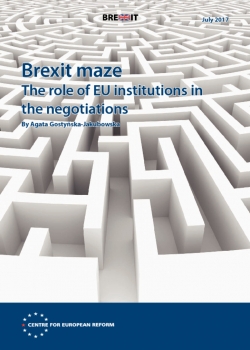
Brexit maze: The role of EU institutions in the negotiations
- On June 19th Michel Barnier and David Davis started the Brexit talks. But EU citizens in the UK and British citizens in other EU countries, as well as businesses, know little more about their post-Brexit future than they knew a year ago when the UK voted to leave the EU.
Theresa May does not have a majority in the newly elected UK Parliament. But it seems unlikely that MPs will force the prime minister to be more open about her Brexit strategy and the difficult choices the UK will have to make as it departs from the EU.
The best hope for citizens, businesses and other groups concerned about Brexit is to look to the EU institutions for information. These institutions have been open about the EU’s negotiating principles and red lines from the moment the UK voted to leave the EU on June 23rd 2016.
Unlike the #britishgovernment #EU institutions have been transparent about their negotiating objectives.
Theresa May has seemingly identified the 27 EU governments as the prime focus of her diplomatic efforts. But EU capitals will not undermine the EU institutions in the Article 50 process. The interests of the 27 are more or less aligned in the withdrawal talks; the institutions can help member-states to defend the EU’s integrity and to maintain a unified front.
The European Council guides the European Commission which negotiates with the UK. Throughout the Brexit talks Michel Barnier will also share negotiating documents with the Council of Ministers and the European Parliament, and report back on progress. This is because the Council will have to conclude the exit agreement after MEPs have voted on the text. The 27 also want the European Court of Justice (ECJ) to have a role in monitoring the application of the exit agreement.
Now is probably the last chance for businesses, citizens and other interest groups to influence the EU’s negotiating team in relation to the divorce terms. Michel Barnier wants to achieve ‘sufficient progress’ with the British on the principles of the divorce deal in early autumn 2017, and then to move on to scoping out future relations with the UK.
However, stakeholders should not put all their eggs in the Commission’s basket. Barnier negotiates on behalf of the EU, but the member-states will steer the Commission’s work from the back seat, either through the General Affairs Council (GAC) or the Council working group on Article 50.
Interest groups should not underestimate the role of the European Parliament in the Brexit talks. They should not wait until the final text of the agreement is on the agenda for ratification before making contact with MEPs.
The EU institutions can help #EU capitals maintain a unified front in #Brexit talks.
Since the EU has said that it will only discuss the future relationship with the UK after it judges that there has been "sufficient progress" in the withdrawal talks, business should not expect the EU institutions to talk about a future UK-EU free trade agreement before the second phase of the negotiations.
The chances of a ‘no deal’ scenario might have fallen as a result of the British general election, but this should not lull businesses and other stakeholders into a false sense of security. They should hope for the best and plan for the worst if they do not want to wake up with a hangover on March 30th 2019.
Agata Gostyńska-Jakubowska is a research fellow at the Centre for European Reform.

